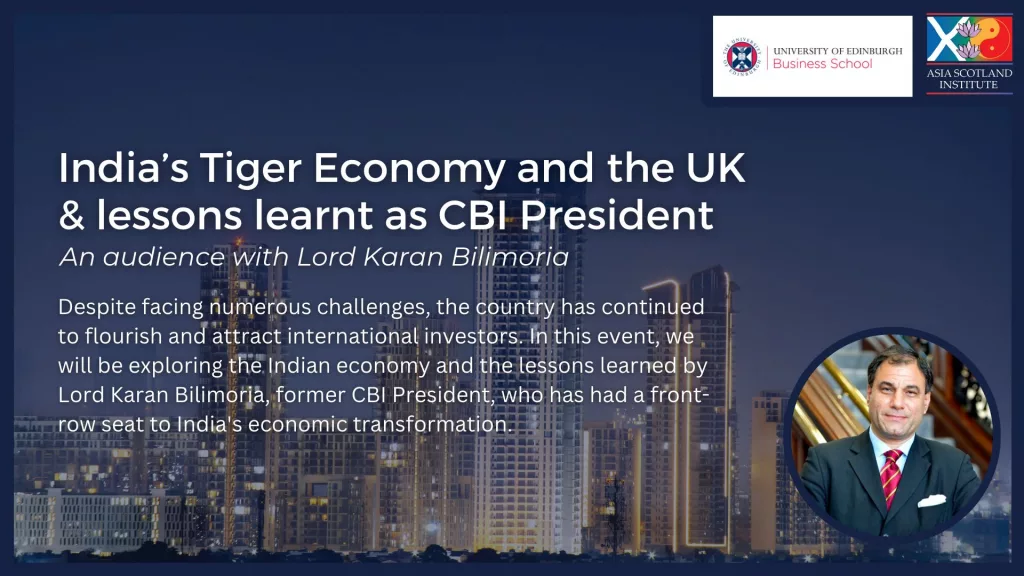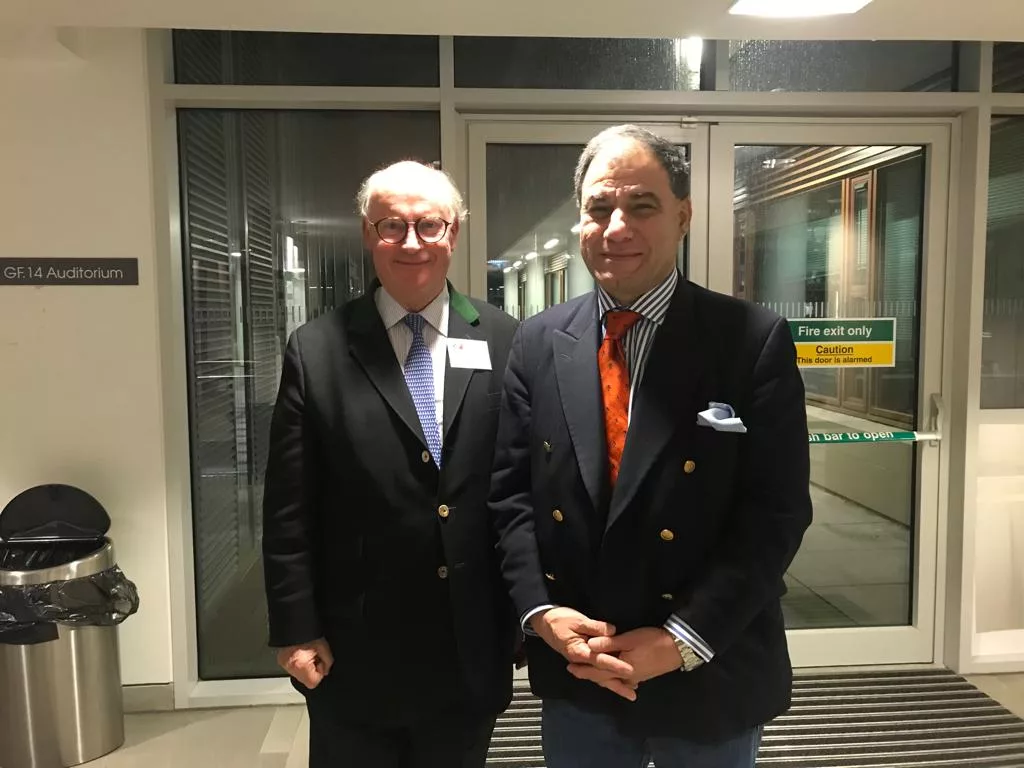To discuss India’s rise, and what it might mean for Britain, Asia and the world at large, the Asia Scotland Institute was honoured to host Lord Karan Bilimoria, recently President of the Confederation of British Industry, Chancellor of the University of Birmingham, and founder of Cobra Beer, for an evening of discussion at the University of Edinburgh Business School. Lord Bilimoria devoted the second half of his presentation to the lessons learned during his time as president of the CBI. Watch the recording here:

Responding to crisis
The standard practice in the Confederation of British Industry is for those appointed President to spend one year as vice-president, learning the ropes, two years in post, and another year as VP mentoring their successor. Lord Bilimoria became vice president in June 2019, expecting a fairly ordinary global environment for his term. Instead, he wryly reflected, he has a claim to have been the CBI’s ‘crisis president’.
Taking the top job in the midst of the first Covid lockdown, Lord Bilimoria was central in convincing the Treasury and Cabinet to extend the furlough programme, in order to protect jobs and industry as the lockdown wore on. He also worked to ensure the steady production and distribution of medical equipment.
Business was hammered by the rollercoaster of on-and-off lockdowns, and the economic damage incurred by the Covid pandemic will take decades to recover from. But the crises were not over yet. As well as the continuing fallout from Brexit, which took effect just before Covid hit, another storm was on the horizon.
Russian forces started to gather ominously on the Ukrainian border in late 2021, and a full scale invasion began early on 24th February 2022. While the Russian military clearly expected a lightning war, Ukrainian resistance was fiercer than anticipated, and no such thing has happened. The war grinds on.
The CBI responded quickly, to do its bit by rallying British industry to help wherever possible. The invasion was on a Thursday; meetings with contacts at the Ukrainian embassy were set on Friday; by Monday supplies, from rations to winter boots, were on their way. Lord Bilimoria points to this rapid response as a stand-out example of what can happen when business and government work together.
‘Asian values’ and the importance of lifelong education
Ever since Japan surged ahead in the 1970s and 1980s, there has been a debate in the West over the significance of ‘Asian values’. From economic performance to world-beating test scores, what is it they have that we don’t? This debate has only got louder as China has risen to global power, and Asian economies have massively outperformed the West.
‘Asian values’ were trumpeted as the secret to success by Singapore’s Lee Kuan Yew. But what are they? Quite simply, says Lord Bilimoria: hard work, discipline, respect for family and for others, and a dedication to education. There really is no specific ‘Asian’ element – any of these values would be recognisable to an ordinary Briton just a generation ago.
Of these, he places the greatest emphasis on education. Lord Bilimoria began his studies early, as part of a program in India that sent students to university at 16. Graduating with a degree in commerce at 19, he immediately went to Britain to qualify as a chartered accountant, working for the firm that would later become EY. He also read law at Cambridge, playing on the polo team. This led to his first business success, importing Indian-made polo sticks after a ban on Argentinian goods came into effect during the Falklands War. University friends also helped launch Cobra Beer.
In his own career, Lord Bilimoria has still found time to return to university several times, attending three business schools – Cranfield, London and Harvard – conducting hundreds of case studies. He argues that all professionals should come to see the value of lifelong education: learning doesn’t end on graduation day.
What is luck?
But of all his case studies, none focused on the role of luck in business. There is an undeniable non-logical aspect to success: sometimes the best ideas, in the best circumstances, fail regardless. Sometimes the unlikeliest projects – or people – succeed wildly.
Lord Bilimoria spoke of some key aspects of success: serendipity and luck. His favourite definition of serendipity comes from his time chairing the Cambridge Judge Business School, and the words of a professor there, Mark Durand: ’Serendipity is seeing what everyone else has seen, and thinking what no one else has thought’. It takes a special talent to find an opportunity where no-one else can.
One definition of luck comes from his time at Harvard, and is quite simple: ‘luck is when determination meets opportunity’. It is much like trying to catch a wave: without determination, they’ll simply pass you by. But there has to be an opportunity in the first place, and it’s essential to know how to spot them.
Finally, Lord Bilimoria heeds the words of an Indian spiritual leader, who once told him that luck was all about timing: ‘if you’ve got a phenomenal idea, but the world and the market is not ready for it, it’s not going to work’. Likewise, ‘if the world and the market are ready for an idea, and you’re not ready, then it’s not going to work’. But if everything comes together at once, success becomes possible.
Want to hear more of Lord Bilimoria’s comments and his wide-ranging discussion with Roddy Gow? Become a member of the Asia Scotland Institute here and get access to an exclusive library of members-only content.
- Sean Paterson
- Sean Paterson
- Sean Paterson
- Sean Paterson
- Sean Paterson
- Sean Paterson
- Sean Paterson
- Sean Paterson
- Sean Paterson
- Sean Paterson
- Sean Paterson
- Sean Paterson







